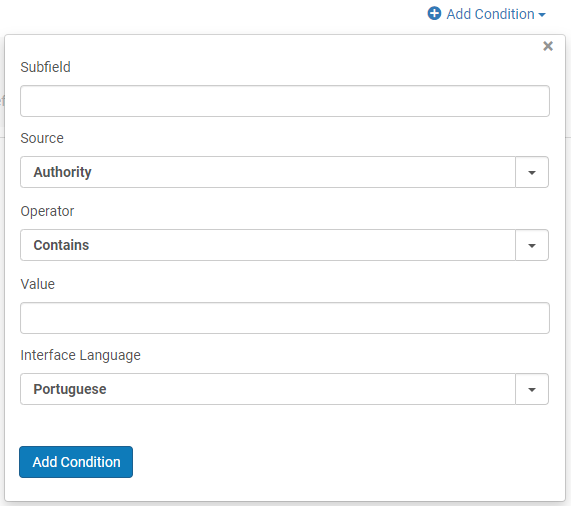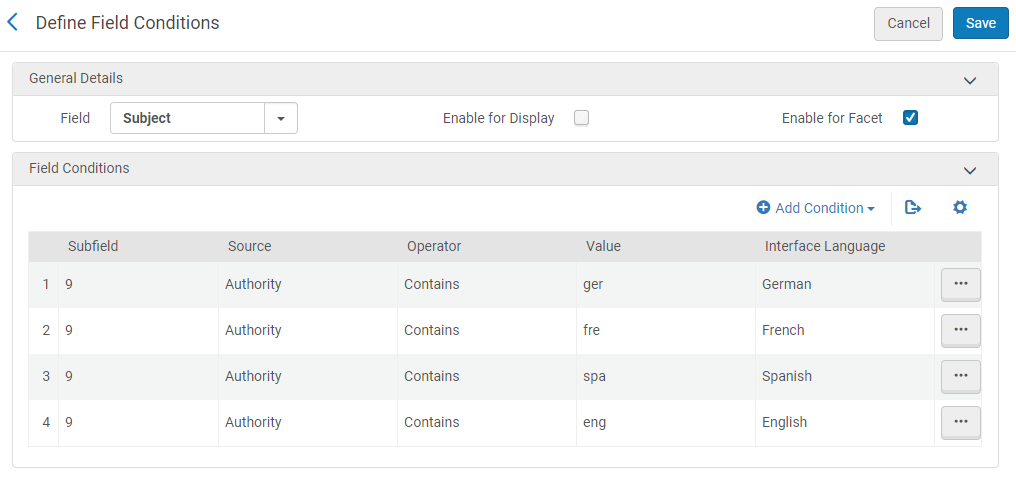Authority Record Enrichment in Primo VE
Introduction
In addition to the indexing of bibliographic metadata, Primo VE indexes preferred and non-preferred terms from 1XX and 4XX fields in related Alma authority records (either local or CZ) along with the following bibliographic record authorization fields:
-
MARC 21 – 1XX, 600, 610, 611, 630, 648, 650, 651, 654, 655, 700, 710, 711, 730, 751, 752, 754, 800, 810, 811 or 830
-
UNIMARC – 410, 411, 416, 500, 600, 601, 602, 605, 606, 607, 616, 617 700, 701, 702, 703, 710, 711, 712, 713, 720, 721, 722, 723, 730, 740, 741, or 742
This enhances Primo VE's search capability by enabling records that match preferred and non-preferred terms to be found.
If you want to index the following 5XX fields to enrich your authority records further, set the index_5XX_authorithy_fields parameter to true on the Discovery Customer Settings page (Configuration Menu > Discovery > Other > Customer Settings):
-
MARC 21 – 500, 510, 511, 530, 548, 550, 551, 555, 562, 580, 581, 582, or 585
-
UNIMARC – 510, 511, 515, 530, 550, 580
In addition, you can configure the following enrichments:
Displaying All Preferred Terms from Authority Records
Out of the box, Facet fields (Subject, Creator, and Contributor) are enhanced with a single preferred term from authority records. If you prefer to display all the preferred terms from authority records, you must set the multiple_languages_preferred_from_authority parameter to true on the Discovery Customer Settings page (Configuration Menu > Discovery > Other > Customer Settings).
When this option is enabled, you must contact Support to run re-indexing.
The following example shows all preferred terms in the authority record that are related to the Schweiz subject heading:
Subject Heading in Bibliographic Record:
650 #7 $$a Schweiz $$9 ger $$0 (twse)3132 $$2 twse
Preferred Terms per Language in Authority Record:
150 $$a Schweiz $$9 ger
150 $$a Suisse $$9 fre
150 $$a Suiza $$9 spa
150 $$a Switzerland $$9 eng
Filtering Preferred Terms from Authority Records by Language
When the multiple_languages_preferred_from_authority parameter is set to true on the Discovery Customer Settings page (Configuration Menu > Discovery > Other > Customer Settings), you can configure authority conditions on the Multi-Lingual Configuration page (Configuration Menu > Discovery > Display Configuration > Multi-lingual Configuration). These conditions enable you to index terms based on language so that preferred terms are displayed to users based on the setting of their interface language in Primo VE. For more information, see Authority Conditions.
For each field (Creator, Contributor, and Subject), you can create a rule that contains a series of conditions that enable you to filter the display/facet values for the field based on language.
-
Open the Multi-Lingual Configuration page (Configuration Menu > Discovery > Display Configuration > Multi-Lingual Configuration).
 Multi-Lingual Configuration Page
Multi-Lingual Configuration Page -
Edit an existing field or select Add New Field to open the Define Field Conditions page.
 Define Field Conditions Page
Define Field Conditions Page-
For languages that do not have a condition defined, the UI displays all items for that field.
-
-
In the Field drop-down list, select one of the following fields: Subject, Creator, or Contributor.
For this functionality, the Creator and Contributor fields share the same configuration. To configure both fields, use only the Creator field.
-
Select the Enable for Facet field.
-
When this option is selected or cleared, you must contact Support to run re-indexing.
-
When this option is enabled in the NZ, it applies to all records in NZ (including those records linked to IZs).
-
When this option is enabled in an IZ, it applies only to local records created in that IZ (not to NZ records that are linked to that IZ).
-
-
In the Field Conditions section, select Add Condition to open the Add Condition dialog box.
 Add Condition Dialog Box
Add Condition Dialog Box -
Create a condition for each language by which you want to filter. Languages that do not have a condition do not display any values if a preferred term contains a language indicator. For example, if a condition exists for both Spanish and French, neither term applies if the interface language is set to German. If a preferred term has no language indicator, it appears for all languages.
Specify the following fields to add a condition:-
Subfield – Specify the subfield in which the field's language identifier is stored. For authority conditions, you must specify subfield 9.
-
Source – Specify Authority, which indicates that authority records are checked for preferred terms of a specific language.
This field only appears when the multiple_languages_preferred_from_authority parameter is set to true on the Discovery Customer Settings page (Configuration Menu > Discovery > Other > Customer Settings).
-
Operator – Specify the operator to use to match the value with the subfield: Contains or Exact.
-
Value – Specify the value of the language identifier that is stored in the specified subfield.
-
Interface Language – The language identifier to which to apply to the field.
-
-
Select Add Condition to save your condition and to return to the Define Field Conditions page.
 Conditions Added for Each Supported Language
Conditions Added for Each Supported Language -
Select Save to save your changes and to return to the Multi-Lingual Configuration page.
Excluding Enriched Author Terms from Full Display
By default, the preferred terms from the Authority record appear in both the Facets in the results and the record's Full Display for the subject and creator/contributor fields. If you prefer to display the preferred terms only for the subject in the record's Full Display, set the exclude_author_from_fulldisplay_authority parameter to true on the Discovery Customer Settings page (Configuration Menu > Discovery > Other > Customer Settings).
Refer to the following table if the multiple_languages_preferred_from_authority parameter is set also to true.
| Configuration in Multi-Lingual Configuration mapping table? | Multi-Lingual Configuration Field Settings | Configuration Results |
|---|---|---|
|
No |
N/A |
For Subject and Creator/Contributor, all preferred terms from Authority record appear in both the facets and record's Full Display. |
| Yes |
Both the Subject and Creator fields are defined. Enabled for display and facets. |
For Subject and Creator/Contributor, all preferred terms based on configured UI language from Authority record display in both the facets and record's Full Display. Terms from undefined languages do not appear. |
|
Only the Subject field is defined. Enabled for display and facets. |
For Creator/Contributor, all preferred terms from Authority record appear in both the facets and record's Full Display. For Subject, all preferred terms based on configured UI language from Authority record appear in both the facets and record's Full Display. Terms from undefined languages do not appear. |
|
|
Only the Subject field is defined. Enabled for facets only. |
For Creator/Contributor, all preferred terms from Authority record appear in both the facets and record's Full Display. For Subject, all preferred terms based on configured UI language from Authority record appear in the facets only. Terms from undefined languages do not appear. Note that the enriched terms for Subject do not appear in the record's Full Display. |
|
|
Only the Subject field is defined. Enabled for display only. |
For Creator/Contributor, all preferred terms from Authority record appear in both the facets and record's Full Display. For Subject, all preferred terms based on configured UI language from Authority record display in the record's Full Display only. Terms from undefined languages do not appear. Note that the enriched terms for Subject do not appear in the facets. |
|
|
Only the Creator field is defined. Enabled for display and facets. |
For Subject, all preferred terms from Authority record appear in both the facets and record's Full Display. For Creator/Contributor, all preferred terms based on configured UI language from Authority record appear in both the facets and record's Full Display. Terms from undefined languages do not appear. |
|
|
Only the Creator field is defined. Enabled for facets only. |
For Subject, all preferred terms from Authority record appear in both the facets and record's Full Display. For Creator/Contributor, all preferred terms based on configured UI language from Authority record appear in the facets only. Terms from undefined languages do not appear. Note that the enriched terms for Creator/Contributor do not appear in the facets. |
|
|
Only the Creator field is defined. Enabled for display only. |
For Subject, all preferred terms from Authority record appear in both the facets and record's Full Display. For Creator/Contributor, all preferred terms based on configured UI language from Authority record appear in the record's Full Display only. Terms from undefined languages do not appear. Note that the enriched terms for Creator/Contributor do not appear in the record's Full Display. |

